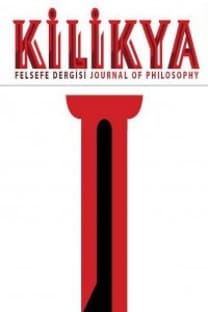Biyoloji Felsefesinde Organizma Kavramı
Organizma, Organizma-Merkezci Biyoloji, Çevre, Etkileşim, Biyoloji.
The Concept of Organism in Philosophy of Biology
Organism, Organism-centred biology, Environment, Interaction, Biology.,
___
- Anderson, R.L. (2017). Friedrich Nietzsche. Edward N. Zalta (Ed.). The Stanford Encyclopedia of Philosophy.
- Baedke, J. (2019). O Organism, Where Art Thou? Old and New Challenges for Organism-Centered Biology. Journal of the History of Biology (52) 293-324.
- Bateson, P., Cartwright, N., Dupré, J., Laland, K. ve Noble, D. (2017). New trends in evolutionary biology: biological, philosophical and social science perspectives. https://doi.org/10.1098/rsfs.2017.0051
- Dupré, J. & Nicholson, J.D. (2018). Manifesto for a Processual Philosophy of Biology. In D.J. Nicholson & J. Dupre (Eds.), Everything Flows: Towards a Processual Philosophy of Biology. Oxford, NY: Oxford University Press.
- Dupré, J. (2012). Processes of Life. Oxford University Press.
- Laland, K., Uller, T., Feldman, M. et al. Does evolutionary theory need a rethink?. Nature 514, 161–164 (2014). https://doi.org/10.1038/514161a
- Laland, K.N., Uller, T., Feldman, M.W., Sterelny, K., Müller, G.B., Moczek, A., Jablonka, E., & Odling-Smee, J. (2015). The extended evolutionary synthesis: its structure, assumptions and predictions. Proc. R. Soc. B 282: 20151019. http://dx.doi.org/10.1098/rspb.2015.1019
- Müller, G.B. (2007). Evo–devo: extending the evolutionary synthesis. Nat Rev Genet 8, 943–949. https://doi.org/10.1038/nrg2219
- Müller, G.B. (2017). Why an extended evolutionary synthesis is necessary. Interface Focus 7: 20170015. http://dx.doi.org/10.1098/rsfs.2017.0015
- Nicholson, D.J. & Gawne, R. (2015). Neither logical empiricism nor vitalism, but organicism: what the philosophy of biology was. HPLS 37(4):345-381.
- Prebble, J.N. (2019). Searching for a Mechanism. A History of Cell Bioenergetics. New York: Oxford University Press.
- Schrödinger, E. (1962). What is Life? The Physical Aspect of the Living Cell. Cambridge University Press.
- Trappes, R., Nematipour, B., Kaiser, M.I., Krohs, U., van Benthem, K.J., Ernst, U.R., Gadau, J., Korsten, P., Kurtz, J., Schielzeth, H., Schmoll, T. & Takola, E. (2021). How Individualized Niches Arise: Defining Mechanisms of Niche Construction, Niche Choice and Niche Conformance. doi: 10.32942/osf.io/wahcy
- Walsh, D.M. (2018). Objecty and Agency: Towards a Methodological Vitalism. D.J. Nicholson & J. Dupre (Ed.), Everything Flows: Towards a Processual Philosophy of Biology. Oxford, NY: Oxford University Press.
- Yılmaz, Ö. (2020). Fenom-Genom Çevre Etkileşimi: Felsefi Bir Analiz (Doktora Tezi). Ege Üniversitesi, Türkiye.
- Yilmaz, Ö. (2021). John N. Prebble, Searching for a Mechanism. A History of Cell Bioenergetics, New York: Oxford University Press, 2019, 276 pp., £55. History and Philosophy of the Life Sciences (43) 34.
- Yilmaz, Ö. (2021). More Plant Biology in Philosophy Education. In Thomas J.J. McCloughlin (Ed.) The Nature of Science in Biology: A Resource for Educators. Graphikon Teo, Dublin.
- Yayın Aralığı: 2
- Başlangıç: 2014
- Yayıncı: Eray Yağanak
Biyoloji Felsefesinde Organizma Kavramı
Bireyleşim Sorunu: Aristoteles’in Bireyleşim İlkesi ve Özdeşlik
Adaletin Anarşisi: Hesiodos’un Kaos’u, Anaksimender’in Apeiron’u ve Geometrik Düşünce
Kirene Okulunda Mutluluk Ahlakının Reddi
Kaybın Farklı Kipleri Üzerine Bir Deneme
Bilimsel İlerleme ile İlgili Son Tartışmaların Değerlendirilmesi
